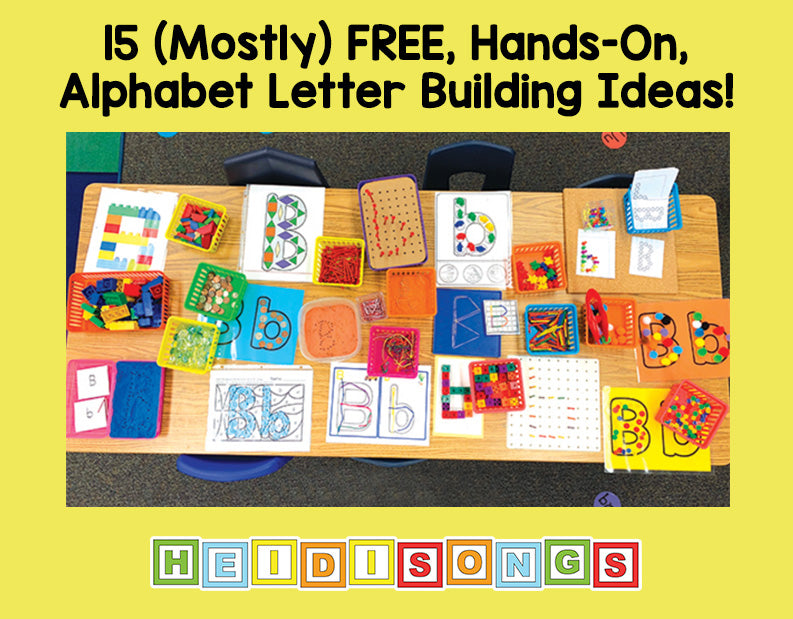

After children have learned to sound out CVC (consonant-vowel-consonant) words, what comes next in reading instruction? This question came up as a comment on one of my blog posts, and as I answered it, I thought that it would be good to share it here. So read on if you are interested in finding out what comes next in reading & phonics instruction after kids have learned to sound out CVC words in Kindergarten or first grade.

I always say that if one person has a question and it is bothering them enough to ask that question online, there must be many more people with the same question! So if you have any questions that you would like me to try to address, please just let me know by leaving a comment on any blog post, or by emailing us at info@heidisongs.com, or by messaging me on Facebook. Thanks!
Question:
HELP!!! I’m teaching phonics for the first time to k-1. I’ve taught them letter sounds and short vowel sounds;cvc words but now I don’t know where to go from there. Long vowels are what I trying next. With no text its hard. I’m using Michael Heggerty’s Phonemic Awareness Program but I don’t know what to use . I’m totally in the weeds and don’t know how to get out!!!
Answer:
I can imagine that it would be very hard to do that for the first time with no experience, no text, and no guidance! That’s a great question. One thing that might help you is my Pacing Guide, which is free to download here. (In fact, you can read an entire blog post about it; the link is below.) However, I wrote it for Kindergarten only, so it might not help you in the case of your first graders. Plus, I didn’t really plan it out to include children going much past CVC words in Kindergarten. I designed it for the average kindergartner, not those that go well past the Kindergarten standards.

At the risk of sounding like this is a commercial, I am going to recommend some of my own products here. I would make sure that your kids have mastered the CVC words first. I would use my CVC books first (there are two volumes,) but your kids don’t need to do all of the worksheets, of course! Just make sure that they can reliably sound out a variety of CVC words with all five of the vowel sounds.

Don’t forget about teaching NONSENSE WORDS, too! Teaching your kids to sound out some nonsense words will also ensure that they are not simply memorizing those CVC words and do have some solid phonics skills in place. We have worksheets for the nonsense words here; just scroll down. You’ll also find our Word Family Songs DVD on the same page if you find that your kids actually have memorized those CVC words and are having trouble blending sounds into words. Children will need to have those phonics skills solidly in place if they are ever going to be able to sound out long, multisyllabic words, such as “encyclopedia,” “denominator,” or “planetarium.” So don’t skip this important step!

Click here to read my post on how to teach nonsense words.
After that, I would go through my Sounds Fun Phonics program. You’ll find all of the supplies that I’m about to mention on this page here. First teach the sounds and letter combinations with the Sounds Fun Phonics cards and then teach them the songs. I prefer the DVD because it has the motions, but either the CD or the DVD is fine.
If you take the children through the Sounds Fun workbooks, Volumes one and two, that can serve as a curriculum. Start with volume one. You may not get any farther than Volume one in Kindergarten, and that is fine. I would show the entire DVD to the children, but focus on the word families in the order that they appear in the volume one workbook first, and then the volume two workbook.

Use the flash cards in the book to introduce the word families and then to practice sounding them out. I like to put them on a pocket chart and then have the children match the words to the pictures. After we know more than one word family, we sort them by sounds into their respective word families. There is a Sounds Fun “Kit” here at this link that combines all of the basic products together at one reduced price ($75 instead of $95.)

This “Sounds Fun Classroom Combo” has all of the supplies you need to teach phonics for just $75. Note that the workbooks are on CD, not printed. You won’t find a better deal anywhere, in my opinion! 
Now it is true that phonics instruction in isolation isn’t the best choice; children really NEED to practice their phonics skills by reading the words in BOOKS. There are some great books that you can even print out free; it will just cost you the price of ink and paper. Check out my blog post on my favorite Emergent Readers here. It has my favorite books to use for this purpose, both free and paid.

AND… I think it goes without saying that you will definitely need to teach the SIGHT WORDS, right? I assumed that you had already done that. If you have not taught any sight words, then you should spend some time doing that for sure! The easiest way to do that is to have your kids sing those sight words, no doubt about it. See the videos below if you are unfamiliar!
Let me know if you have more questions! 
Heidi
————
















